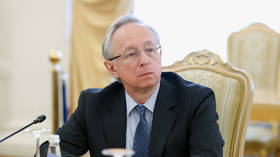US opening ‘second front’ against Russia – Moscow

Washington has long been eager to open “a second front” against Russia in the South Caucasus by interfering in regional affairs, Deputy Foreign Minister Mikhail Galuzin has said. His comments came amid an all-time low in ties between Russia and the US, due to Washington’s push to support Kiev in its fight with Russia.
In an interview with RIA Novosti on Saturday, the senior diplomat weighed in on tensions between Armenia and Azerbaijan fueled by the decades-long stand-off over Baku’s breakaway region of Nagorno-Karabakh. The self-proclaimed republic was officially dissolved in September after a successful large-scale Azerbaijani military operation in the predominantly Armenian enclave.
Galuzin noted that it was up to the two countries to decide whether to sign a peace treaty to end the conflict that dates back to the early 1990s. However, he signaled that Russia “cannot remain indifferent to what is happening in the South Caucasus,” recalling that Moscow has very close cultural and historical ties with ex-Soviet republics and opposes any foreign meddling there.
Washington makes no secret of the fact that it sees the South Caucasus as a springboard for opening a ‘second front’ against Russia. This is fundamentally at odds with the true interests of the people of the region.
The diplomat stressed that only the countries of the region could define its future, arguing that no outside party would usher in peace and stability there. “Betting on ‘miraculous’ Western assistance is delusional and dangerous,” Galuzin said, noting that Western interventions in Iraq, Afghanistan, Libya, Syria, Ukraine, and Serbia’s breakaway region of Kosovo have brought only devastation and misery.
“The pattern is simple: first, they meddle somewhere under the guise of nice slogans, and wreak havoc. And when it all heats up, they flee, leaving scorched earth behind,” he suggested.
Nagorno-Karabakh broke away from Baku’s rule in the early 1990s. The following decades were marked by two major wars and intermittent fighting between Azerbaijanis and Armenians. Meanwhile, in recent months relations between Russia and Armenia, which remains an ally of Moscow in the Collective Security Treaty Organization (CSTO), have soured as the latter pursued closer military ties with the US, including staging joint exercises.
After Baku regained control of Nagorno-Karabakh, Yerevan also accused Russian peacekeepers of failing to protect ethnic Armenians in the enclave.
However, Russian President Vladimir Putin has said that Moscow’s military could only observe the ceasefire in the region. He also suggested that Armenia had given Azerbaijan a free hand in the area after it recognized Baku’s sovereignty over the enclave.












